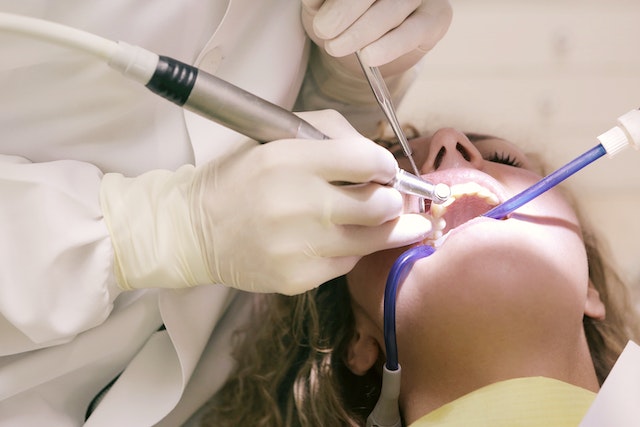- Good dental hygiene habits, such as brushing twice daily and flossing once daily, are essential for optimal oral health.
- Sugary, acidic, and chewy foods can lead to cavities, enamel erosion, and tooth decay.
- Regular checkups with a dentist should be a part of any good dental hygiene routine.
- Dental procedures such as implants, crowns, bridges, and cosmetic treatments strengthen weakened teeth and enhance smile aesthetics.
- Proper dental care is essential for overall physical and mental well-being.
Dental health is often overlooked regarding overall physical, mental, and emotional well-being. This is partly because it is not as visible as other aspects of health, such as physical activity or mental clarity. However, its importance should not be underestimated. Poor dental health can cause many serious issues, such as gum disease, tooth decay, and even heart disease. It can also lead to embarrassment or social isolation due to bad breath and discolored teeth.
According to the World Health Organization (WHO), approximately 3.58 billion people worldwide suffer from untreated dental caries, which accounts for more than one-third of the global population over age five. In addition, an estimated 486 million individuals are affected by gingivitis, with two out of three adults in their late twenties suffering from periodontal diseases. Gum disease is prevalent among those with poor oral hygiene habits or who cannot access regular checkups with a dentist due to financial difficulties or lack of insurance coverage.
Dental health is more vital to your life than you think, making it essential to prioritize it and ensure you are taking the necessary steps to maintain it. Here are a few to consider:
Dental Hygiene Habits

Good dental hygiene habits are essential for maintaining optimal oral health. Brushing twice daily and flossing once daily are the foundation of good oral hygiene. This removes plaque and bacteria from your teeth, promoting fresher breath and reducing the risk of decay, cavities, and gum disease. Additionally, using an antiseptic mouthwash can help to reduce bacteria in the mouth further and reduce bad breath.
It is also essential to ensure that you are brushing for at least two minutes each time – this ensures that your teeth are adequately cleaned throughout. Also, please ensure you brush for at least two minutes, touching all surfaces of your teeth and behind your back molars. Replacing bristles on toothbrushes every 3-4 months or after any illness, such as a cold or flu, is also recommended.
In addition to proper brushing technique, regular visits to the dentist should be a part of any good dental hygiene routine. Regular checkups allow dentists to diagnose potential problems early on before they become more severe or difficult to treat. In addition, dentists can offer advice regarding diet and lifestyle changes that may improve oral health. Professionals can provide cleanings and thorough examinations during a dental visit to catch conditions such as cavities or gingivitis before they worsen.
Reducing Teeth Damaging Food and Drinks

The food people eat and drink can significantly affect their dental health. It might not seem like it, but constant consumption of particular food and drinks can wreak havoc on teeth.
Here are some of the worst offenders:
Sugary Foods and Drinks
Sugary foods and drinks are some of the worst offenders regarding dental health. Sugar is a significant cause of cavities, as it feeds the bacteria in the mouth and creates an acidic environment that weakens enamel. Consumption of sugary drinks, such as soda, can also lead to enamel erosion due to their high acidity levels.
Acidic Foods and Drinks
Acidic foods and drinks can also be damaging to dental health. These include citrus fruits such as oranges, lemons, and limes; acidic juices; pickles; tomatoes; vinegar-based salad dressings; red wine; coffee and tea; highly spiced dishes; and salsas. The high acidity levels in these items break down enamel over time if consumed regularly or in large quantities.
Chewy Foods
Chewy foods are also a primary culprit for dental health issues. Chewing on hard candy or dried fruits such as raisins can contribute significantly to tooth decay due to their stickiness and prolonged exposure to sugar. Chewy cereals, granola bars, beef jerky, store-bought pretzels, hard bread rolls, and raw vegetables (such as carrots) can also become stuck between teeth for long periods if not correctly cleaned away after eating them.
Starchy Foods
Starchy carbs, like chips, are another major contributor to dental health issues. Chips are full of carbohydrates that feed bacteria in the mouth, producing acids that erode enamel over time. They can also become stuck between teeth contributing further to problems with plaque buildup that lead to tooth decay or periodontal diseases such as gingivitis.
Getting Dental Procedures
Getting the proper dental procedures when needed is essential for maintaining healthy teeth and gums. Dental implants, for example, can help replace missing or severely damaged teeth that can cause significant pain and the inability to chew properly. Implants also prevent the further spread of tooth decay and gum disease.
In addition, treatments such as crowns and bridges can help restore function and appearance to otherwise damaged teeth or those with large cavities. These procedures also provide additional strength to weakened teeth which helps prevent future damage.
Furthermore, cosmetic treatments such as whitening or veneers are available to improve smile aesthetics without causing any harm to exist natural teeth structures. Investing in these dental procedures goes beyond enhancing physical appearance; they play an essential role in helping maintain optimal oral health over time.
Final Thoughts
Dental health should not be underestimated. Taking the necessary steps to maintain it is essential for overall physical and mental well-being. The steps outlined here are just the beginning of what you can do to ensure optimal dental health. Proper care lets you keep your teeth healthy and maintain a bright smile that will last a lifetime.

